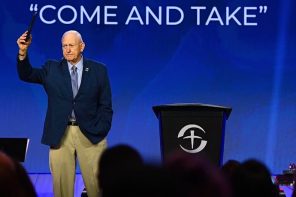Rick Perry’s decision to stick by his rhetorical guns at the presidential debate last week and continue to insist that Social Security is a “Ponzi scheme” and a “monstrous lie” has drawn mixed reactions from fellow conservatives, and attacks from his presidential rivals, most immediately Mitt Romney. Michele Bachmann, too, will reportedly criticize him at the Tea Party-sponsored debate tonight in Tampa, Florida. A Bachmann adviser tells the Washington Examiner’s Byron York, “Clearly she feels differently about the value of Social Security than Gov. Perry does. She believes Social Security needs to be saved, that it’s an important safety net for Americans who have paid into it all their lives.”
Perry did not invent the Ponzi scheme analogy for Social Security; back in 1995, economist James Glassman (he who wrongly predicted that the Dow would hit 36,000) opined that Social Security was like a “Ponzi scheme” in the service of his argument that it should be privatized. (His failed prognostications on the robustness of the stock market should’ve put a big pin in that trial balloon.) And if you read the Austrian school economists and bloggers at the Von Mises Institute, you will find the inapt analogy deployed frequently as well.
While not comparing Social Security to a Ponzi scheme, Bachmann has compared public employee benefit plans and employer-sponsored pensions to such a criminal enterprise. At last year’s Values Voters Summit, she said:
what has crippled GM, what’s crippled Chrysler, what has crippled all of the public employee unions, it was promising these Ponzi-scheme style benefits and pension benefits with absolutely no reasonable way of paying them off. Which reflects another value that all of us cherish, and it’s this: Thou shalt not covet what does not belong to us.
There’s another angle on biblically-motivated opposition to these supposed “Ponzi schemes:” one prophecy-hunting pastor believes their role in a financial armageddon was foretold in the Bible. In his 2010 book, The Coming Economic Armageddon: What Bible Prophecy Warns about the New Global Economy, San Diego megachurch pastor, radio host, and Tim LaHaye protégé David Jeremiah likens Social Security to a Ponzi scheme and adds that “financing massive entitlement programs, wars, and runaway big government” were “predicted twenty centuries ago in the New Testament letters of James” and figure “prominently as a sign of the coming economic Armageddon.” The book is a favorite of Glenn Beck’s, who declared that it exposes what he imagines to be linkages between the global financial crisis and the coming “new world order.” (Jeremiah last year called President Obama a “dangerous person” because he is a “globalist” heading the country toward “socialism.”)
Lest you leap to any conclusions about Perry being influenced by the likes of Jeremiah, the American Family Association’s news service reports today that Jeremiah is “impressed” with Perry but that the Texas governor has some explaining to do about his relationship with Ismaili Muslim Community leader the Aga Khan, a subject about which Justin Elliott reported at Salon. The notoriously anti-Muslim AFA, aparently unaware or unconcerned about this relationship, bankrolled Perry’s prayer rally The Response.
Whatever its source, Perry’s “Ponzi scheme” analogy, while under fire from some Republicans, is being hailed by others. Pete Wehner, the conservative pundit who served as a speechwriter (or, as Jonathan Chait called it, “Minister of Propaganda”) for George W. Bush, writes of Perry’s Ponzi scheme remarks:
These are words that will come back to haunt the presidential candidate, we’re told.
Perhaps. Or perhaps not. Whatever the case, on substance, Perry is quite right.
So do Perry’s comments originate in the fever swamp of the Tea Party and biblical prophecy, or from Washington insiders? Wehner, it should be noted, has lashed out at Beck and his view of the world, calling the role he is playing “harmful in its totality.” The great Ponzi scheme analogy of 2011 just might be an example of a breakdown of the much-vaunted conservative message discipline.




